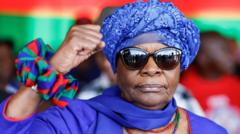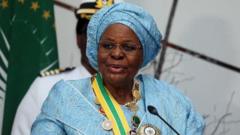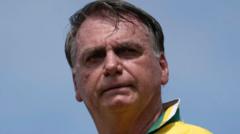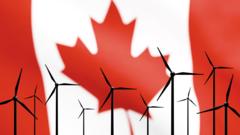Namibia is poised to make history with the potential election of its first female president, Netumbo Nandi-Ndaitwah, amid significant societal challenges and political rivalry. Her main opponent, Panduleni Itula, brings a fresh perspective to the political scene, making this election a crucial moment for the nation.
Namibia's Pivotal Presidential Election: Will the Country's First Female Leader Emerge?

Namibia's Pivotal Presidential Election: Will the Country's First Female Leader Emerge?
As Namibia approaches a historic election, Vice-President Netumbo Nandi-Ndaitwah strives to become the first female president, challenging a backdrop of disillusionment with long-standing governance.
Namibia stands on the brink of a historic election that could see the nation elect its first female president. Vice-President Netumbo Nandi-Ndaitwah, age 72, represents the long-ruling Swapo party, which has held power since the country gained independence from South Africa in 1990. While Nandi-Ndaitwah’s candidacy is a milestone for women's representation in politics, significant challenges loom due to a pervasive sense of disillusionment with long-established liberation movements across southern Africa.
Her main challenger, the 67-year-old Panduleni Itula from the Independent Patriots for Change (IPC), has emerged as a formidable opponent, appealing particularly to Namibia's youthful electorate, which constitutes nearly half of the voter base. With high levels of youth unemployment, currently at 19%, and dissatisfaction with local governance, Itula has garnered support through his tailored approach and necessity for economic reforms.
Nandi-Ndaitwah's political journey, having joined Swapo at 14, includes years of service in various ministerial roles, emphasizing her substantial experience in leadership. Known for her practical and community-oriented leadership style, Nandi-Ndaitwah is regarded by some as a steady figure during uncertain times.
Conversely, Itula’s background as a trained dentist and ex-Swapo member, expelled in 2020 for openly critiquing the party, positions him as a ‘new face’ in Namibian politics. His bold campaigning style resonates with younger voters eager for change and better economic opportunities. Political observers anticipate a tightly contested election, with speculation that, given the divided opinions of the electorate, a second round may be necessary should neither candidate secure a majority.
As voters weigh their choices, the issues of corruption, healthcare, education, and the management of natural resources will play critical roles in determining the election outcome. Both candidates aim to present themselves as trustworthy alternatives, yet they represent vastly different visions for the future of Namibia. For many, this election embodies the hope for transformative leadership within a political landscape long dominated by traditionalist narratives.























